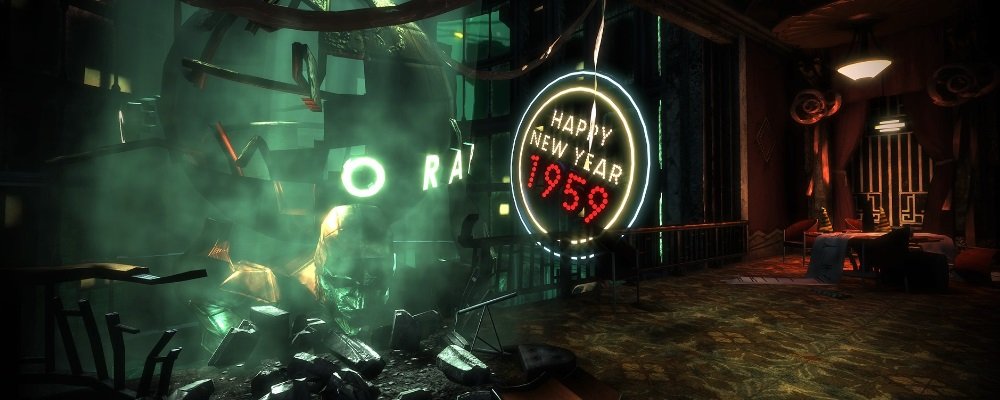Get ready for the hot takes
Beware of BioShock spoilers — you have been warned!
Here I was with an article queued up about how the phrase “ludonarrative dissonance” fell off the face of the earth, and then I log onto Twitter yesterday to see all my game dev mutuals fervently discussing this hotly-debated topic in games criticism. It was only a matter of time before the polarizing term made its way back into the conversation.
One fateful day in 2007, developer Clint Hocking, best known for directing titles like Tom Clancy’s Splinter Cell and Far Cry 2, published an article laying out his ideas on storytelling in games and coined the expression “ludonarrative dissonance.”

It’s a fancy-sounding phrase, but the definition is fairly simple: it means that the story the game is telling through cutscenes, dialogue, etc., and the story that the player is acting out through gameplay aren’t aligned. To break the term down a bit: “ludo” or “ludic” refers to the act of play, while “narrative” — pretty self-explanatory. Dissonance is the opposite of harmony, meaning things clash rather than work together.
In Hocking’s original post, he proposed the term after having played BioShock. His ideas are well-argued and have nuance to them, but ultimately it boils down to the idea that the game’s narrative is centered around Ayn Rand’s philosophical principles of Objectivism, but the gameplay gives you a “bad” ending, and therefore judges you, for making decisions that are in your own self-interest. In addition, Hocking says the player is funneled into one linear route, which is at odds with the game’s themes of free will.
I disagree with that last point specifically, because the whole deal with BioShock‘s story is the illusion of free will, only to learn that you were acting under the commands of Andrew Ryan in the game’s iconic twist. I think that reflects modern game design quite well, because often when players feel as though they have complete control, every move they make was anticipated and accounted for by the developers. It had to be, otherwise the game wouldn’t work. But this isn’t why we’re here, so we’ll save that article for another day.

If the games industry is young, any academics around the medium are even younger. I first got back into games when I was doing my undergraduate in classic literature, so I spent a lot of time in school scouring the library for any scholarly work I could find on video game storytelling. This was already after the idea of ludonarrative dissonance had fallen out of the lexicon, because from what I understand, it became overused and outdated.
But nevertheless, I was pumped to have an academic idea about games to latch onto — it was something I could bring to my professors at my tiny Southern university who thought Call of Duty was the only game that existed, and show them that people are having thoughtful, intelligent conversations about how we tell interactive stories. Ludonarrative dissonance is an idea that could only exist in the medium of video games, which already makes it attractive, and let’s be honest, it makes us feel smart when we say it.

When it comes down to it, ludonarrative dissonance doesn’t bother me all that much. BioShock and Uncharted are the poster-children of this conversation (Nathan Drake’s good-guy persona and alarmingly high body count are at odds with each other), and while those are nice examples to use for the sake of argument, their supposed dissonance obviously hasn’t ruined the experience of playing those titles for most people considering they are some of the most beloved games of all time.
I think what’s most important is looking at the overall experience. It’s like when I watched Back to the Future with my brother-in-law, and he said he liked it, well except for the “plot hole” of the newfound infinite loop of Marty’s going back in time. To me, those conversations are just splitting hairs, because whether or not that paradox happened in the universe of the movie doesn’t have any bearing on the immediate storytelling experience. Other than the aspects of that film that, uh, haven’t aged well, the script is perfectly paced, has great character arcs, and generally kicks ass.
Every storytelling medium has its limitations, or things that it just has to do for us to be able to consume that story. When reading a book, we have to turn the pages. When seeing a movie, we have to deal with the sound of our neighbor loudly wrestling with their candy wrapper. When seeing a musical, we know there’s no logical way that these characters would all know the same choreography and break it out in public. Those are things that can take us out of the experience and break our immersion, but we train ourselves to tune them out. You surrender some of your logic, and, in turn, get the magic of storytelling.

So I don’t mind the conversation of ludonarrative dissonance popping up again at all — it means we’re having thinking a lot about how games tell stories, and the more of that we have the better! I just don’t want us to get too in the weeds that we lose sight of the overall experience. As games continue to mature, I’m sure we’ll find less clunky ways to tell more harmonious stories, but for now, I think we’re on the right track.
Story Beat is a weekly column discussing anything and everything to do with storytelling in video games.







